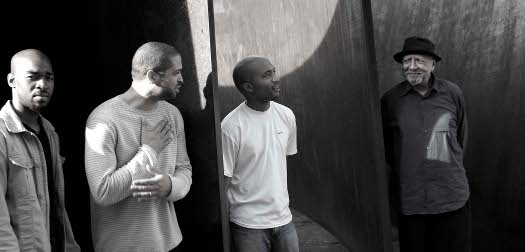Shows
Charles Lloyd Quartet
January 23, 2011 at Flynn Center in Burlington‚ VT
by Doug Collette
January 30, 2011
Charles Lloyd Quartet
January 23, 2011 at Flynn Center in Burlington‚ VT
by Doug Collette
January 30, 2011
|
|
|
|
 |
||
|
|
|
The Charles Lloyd Quartet's January 23rd appearance at The Flynn Center for the Performing Arts illustrated the essential virtues of acoustic jazz. The best moments of their collective playing in Burlington exhibited the purity and simplicity that holds such great attraction for the devoted music lover as well as the dilettante.
The first half-hour of the ninety plus total was far and away superior to the disjointed likes of the remainder of the set‚ if only because the quartet's music remained solidly of a piece throughout this interval. As the four took their solos‚ there was no discernible drop-off in the intricacy set by Lloyd's forlorn yet resolute sax. Each individual became the leader of the band when it came his turn to showcase himself: bassist Reuben Rogers‚ for instance‚ propelled the low notes from his double bass out over those in attendance (whose total fell far short of filling the venue).
The uniformly quasi-mystical tone of the music was shattered by Eric Harland's solo‚ the first of two protracted spotlights he received this frigid winter evening. It's not that the intense drummer didn't deserve the consideration‚ but that his attention to nuance and sense of dynamics were just as striking‚ immersed in the band collective or fencing with pianist Jason Moran‚ as when his three comrades dropped out.
Moran‚ the most high-profile member of the group besides the leader‚ played a largely subservient role during the early part of the concert but became more prominent as the set evolved‚ offering extended melodic intervals bereft of the usually knotty progressions he prefers. He did‚ however‚ jump off the steady shuffle of the late-evening blues to comp in abstraction for a moment‚ which made the authoritative return of the whole band‚ led by Harland's crashing cymbals and kick drum‚ all that much more dramatic.
Though less modesty and more solos from Charles Lloyd‚ in a more unified structure‚ might've been preferable during this concert at The Flynn‚ the music was nevertheless mesmerizing when‚ his back arched or knees bent‚ the leader was ever so gently coaxing sounds from his sax or flute. Those moments alone fully justified the raucous and respectful standing ovation he and his quartet received at the end of their set.
related articles
Albums: SFJAZZ Collective - Music of Stevie Wonder and New Compositions (Season 8)
Features: Staff Picks: Best of 2010
Features: Musicians'/Music Industry Folks' Favorite Moments of 2008
Features: Conversation with Jenny Scheinman
Magazine: State of Mind - May/June 2008
More on: Charles Lloyd, Jason Moran, Eric Harland, Reuben Rogers
Albums: SFJAZZ Collective - Music of Stevie Wonder and New Compositions (Season 8)
Features: Staff Picks: Best of 2010
Features: Musicians'/Music Industry Folks' Favorite Moments of 2008
Features: Conversation with Jenny Scheinman
Magazine: State of Mind - May/June 2008
More on: Charles Lloyd, Jason Moran, Eric Harland, Reuben Rogers
new to state of mind
Shows: moe.
Shows: Yonder Mountain String Band
Shows: Grand Point North 2014
Shows: Catskill Chill 2014
Shows: moe.down 15
Shows: Gov't Mule
Shows: Umphrey's McGee
Shows: Newport Folk Festival 2014
Shows: Widespread Panic
Albums: Phish - Fuego
Shows: moe.
Shows: Yonder Mountain String Band
Shows: Grand Point North 2014
Shows: Catskill Chill 2014
Shows: moe.down 15
Shows: Gov't Mule
Shows: Umphrey's McGee
Shows: Newport Folk Festival 2014
Shows: Widespread Panic
Albums: Phish - Fuego
random awesomeness
Shows: Life is good Festival
Features: Conversation with Tim Motzer
Shows: Van Halen
Features: Conversation with Tommy Benedetti of John Brown's Body
Features: Conversation with Phil Lesh
Blog: He Got Lost in Phantogram
Blog: Best Songs of 2012: The Reverend Peyton's Big Damn Band - "Devil's Look Like Angel's"
Blog: 2010 - The Summer of Dream-Pop
Features: Musicians'/Music Industry Folks' Favorite Moments of 2008
Blog: Song of the Day: John Mayall - "So Hard to Share"
Shows: Life is good Festival
Features: Conversation with Tim Motzer
Shows: Van Halen
Features: Conversation with Tommy Benedetti of John Brown's Body
Features: Conversation with Phil Lesh
Blog: He Got Lost in Phantogram
Blog: Best Songs of 2012: The Reverend Peyton's Big Damn Band - "Devil's Look Like Angel's"
Blog: 2010 - The Summer of Dream-Pop
Features: Musicians'/Music Industry Folks' Favorite Moments of 2008
Blog: Song of the Day: John Mayall - "So Hard to Share"
